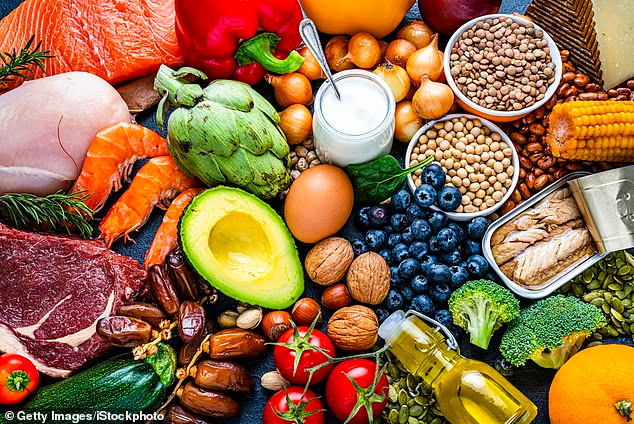Sticking to a diet packed with fruit, pulses and nuts may give you a fighting chance of easing irritable bowel syndrome (IBS) symptoms, a new study suggests.
A Mediterranean-style diet plan has long been hailed as the secret behind Italians and Spaniards living long and healthy lives, as well as low rates of obesity and diet-related illnesses.
Now, British scientists have discovered that sticking to the plan may be more effective at tackling IBS than current NHS guidance.
Assessing the diets of over 100 adults, researchers found that those who followed the Mediterranean diet saw a ‘significant’ improvement compared to those who did not eat a plant-rich diet.
Researchers today labelled the plan a ‘simple. enjoyable and highly effective first step’ in managing IBS and said their findings could help doctors inform patients on how best to help them manage their symptoms.
Dr Imran Aziz, a senior clinical lecturer in gastroenterology at the University of Sheffield, and study co-author, said: ‘For millions of people worldwide, IBS symptoms can severely impact daily life.
‘Our study provides strong evidence that the Mediterranean diet can be a simple, enjoyable, and highly effective first step in managing this common condition.
‘The Mediterranean diet was found to be not just as good as traditional dietary advice, but actually significantly better at reducing symptoms.
A Mediterranean-style diet plan has long been hailed as the secret behind Italians and Spaniards living long and healthy lives, as well as low rates of obesity and diet-related illnesses
‘This is great news because it means patients can adopt a widely accepted, healthy eating pattern that offers superior relief without needing the immediate burden of a highly restrictive diet such as the low-FODMAP diet.’
IBS is one of the most common digestive conditions and is thought to affect around 4 in 100 people globally.
It is usually a lifelong condition, causing stomach cramps, bloating and diarrhoea.
Current NHS guidance includes the low-FODMAP diet, which involves removing high-FODMAP foods.
FODMAP stands for fermentable oligosaccharides, disaccharides, monosaccharides, and polyols.
Common foods with gas-producing FODMAPs include broccoli, beans and lentils, wheat, garlic, onions, apples, and some fruit juices.
In the study, researchers at the University of Sheffield and Sheffield Teaching Hospitals NHS Foundation Trust compared the effectiveness of this traditional advice to the Mediterranean diet.
The trial included 139 people living with IBS, with 68 following the Mediterranean diet for six weeks and 71 following traditional dietary advice.
Your browser does not support iframes.
Each group took part in 30-minute online education sessions about their diets and were emailed supporting information.
The study, published in Annals of Internal Medicine, found 62 per cent of those following the Mediterranean diet reported a significant improvement in their symptoms compared with 42 per cent in the other group.
Writing in the journal, the researchers said the Mediterranean diet should now be considered a ‘first-line IBS therapy’.
Dr Aziz added: ‘Using a Mediterranean diet as an initial treatment also potentially simplifies care for both patients and healthcare providers.
‘These findings will inform future guidelines for the management of IBS.’
Share or comment on this article:
Mediterranean diet ‘most effective way’ to treat IBS, scientists discover
Images are for reference only.Images and contents gathered automatic from google or 3rd party sources.All rights on the images and contents are with their legal original owners.

